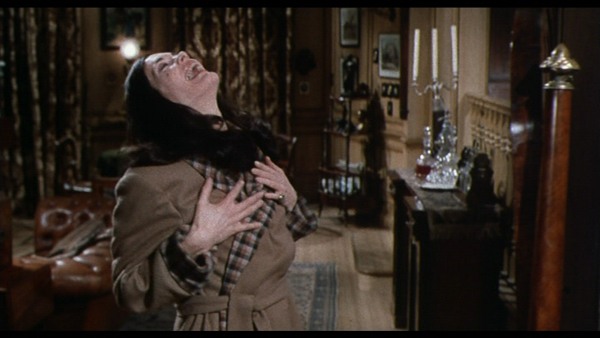Dr Jekyll & Sister Hyde (1971)

Legendary Hammer craftsman Roy Baker Ward here turns his hands to twisted, and ripe spin on the classic horror tale. Once again set in Victorian, London, Dr Jekyll (Raph Bates) embarks upon a radical experiment, using fresh female hormiones from stolen corpses in an attempt to wipe out common diseases. Of course this madcap venture back fires famously, and the result is the creation of Jekyll's highly sexualized and deadly female alter-ego Sister Hyde! Soon, things get out of hand and there is a killing spree across Whitechapel, with the lives of Susan Spencer and her brother Howard, also intengled.
The subversion of plot and characters is a cruical part of this malodramtic horror, and the scene is nicely set by David Whitaker's heightened, score, which in itself, plays like a character in the film. The classical opening piece of music, drifts along beside, the gentle deep redness of a velvet curtain. This gives us a setup for what is to come. During the opening scene, Ward's camera drifts from a shot of a dead rabbit and the butcher who killed it, we then take in the sleepy Victorian landscape, with a whole host of murky characters in a busy town centre. This leads us to a joyful call girl on her way to turn tricks. However, rather than showing us her journey in linear fashion, Ward intercuts this, with a Policeman approaching, and further shots of the butcher and the knife. We then cut sharply back to the call girl who is suddenly, and brutally murdered by a knife! This use of discontenity editing, throws the viewer in and out of the scene, and makes them question what is about to occur, or even who is commiting the murder. Things are further complicated by the shot of the Policeman standing over the dead body, before cutting to Dr Jekyll who is revealed as the real killer.
The direction also navigates through tight spaces, creating fresh life to what otherwise could have been, stuffy, and flat sequences. I like the camera movements, during an early scene where Jekyll first meets with Prof. Robertson (Gerald Sim). The shots are fluid for the most part, keeping a tight track of the characters back and fourth conversation. Their quick movements, and buttoned up dialogue hints at something more theatrical lurking, but then the tightly framed close-ups and fragmented shots, such as Robertson's cheeky gaze at Susan Spencer (Dorothy Alison), for whom he has quickly become attracted to, suggest a televisional mode of direction. But, whereas many directors would linger on these shots, in stand Ward wipes us back into the Robertson's interaction with Jekyll. Such close-ups and framing of character's expressions also serve the function of the cheesy and observational form of comedy. Lewis Fiader as Howard, Susan's brother, often resembles a sly, camp, Carry On outcast. His dry features play off, the naughty suggestions of his lines and delivery, such as the moment when he finds out that Jekyll appears to be entertaining a female (in fact he has seen sister Hyde). His struggle to restrain the glee and ripe delivery of the line, "who would have thought that Dr Jekyll would know a woman like that, didn't know he had it in him." There is even some good camp joy to be had in the suggestion than Howard's jealousy over Susan's interest in Jekyll is linked to a certan romantic torch he might hold for his sibling. His playful smirk, following her suggestion that he carry a box, "you did want to help afterall" could be a brief nod to this.
Of course, these slight mannered character moments, are later subverted into something all the more malodramtic, twisted and rich. The transformation scene of Jekyll into Sister Hyde is a delightfully, playful, and yet unhinging piece of film. Bates perfectly sells the conflict and struggle of the character. The scene again blends dramatic acting, with something more thearical. The visual style and movements of the character upon transforming, are inventively chronographed through the rich music, and wide open space of the scene. Martine Beswick as Sister Hyde then does a fine job of portraying the devilish rapture of the more confident, yet sister personality. The loss of control during the shot of him/her feeling the breast in the mirror, is the perfect round off to a truly remarkable scene.

Again, as a point of contrast, some of the murder scenes have multed colour tones, the setpieces delivered with some of the fine precision of some of Dario Argento's finest killings. As the tension builds, the odd seduction scenes such as the one with the Prof. are super fun, and yet minor connect the dots moments, in order to the lead us to the character's final third struggle/breakdown which is gloriously camp fun, filled with dramatic flair, and stylish energy. The ending is maybe a bit predictable, but then it was never a film about the ending. A cult gem, as rich and joyful, as perhaps any screen version of the original text.
Keith Beard.



